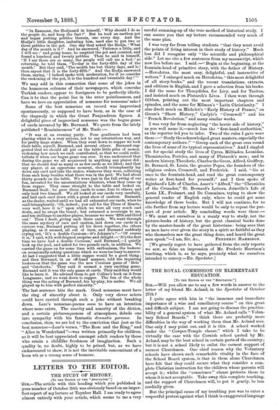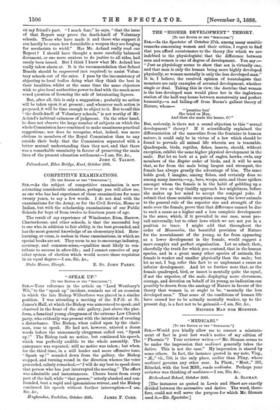THE ROYAL COMMISSION ON ELEMENTARY EDUCATION.
[To THE EDITOR OF THE " SPECTATOR:'] you allow me to say a few words in answer to the letter of my friend Mr. Acland, in the Spectator of October 27th ?
I quite agree with him in " the immense and immediate importance of a wise and conciliatory course " on this great and difficult subject. I am not going to discuss the practica- bility of a general system of what Mr. Acland calls " Volun- tary School Boards." I think there are probably more difficulties in the way of working them than Mr. Acland sees. One only I may point out, and it is this. A school worked under the " Cowper-Temple clause," which I take to be virtually the case with the Cornish school quoted by Mr. Acland, may be the best school in certain parts of the country ; but it is not a school likely to enlist the earnest support of earnest Churchmen. One chief reason why the Voluntary schools have shown such remarkable vitality in the face of the School Board system, is that in them alone Churchmen have felt that they could secure what they consider a com- plete Christian instruction for the children whose parents will accept it ; whilst the " conscience " clause protects those to whom it is not acceptable. Take away this complete teaching, and the support of Churchmen will, to put it gently, be less cordially given.
But the principal cause of my troubling you was to enter a respectful protest against what I think is exaggerated language
on My friend's part. " I much fear," he says, " that the issue of that Report may prove the death-knell of Voluntary schools. Those who have made it and those who support it can hardly be aware how formidable a weapon they are forging for secularists to wield." Has Mr. Adamd really read our Report ? I should have thought a more carefully balanced document, or one more anxious to do justice to all sides, bad rarely been issued. But I think I know what Mr. Adana has really taken alarm at. It is the recommendation that School Boards should be empowered (not required) to assist 'Volun- tary schools out of the rates. I pass by the inconsistency of objecting to local bodies doing what they think the best in their localities, whilst at the same time the same objectors wish to give local authorities power to deal with the much more vexed question of licensing the sale of intoxicating liquors.
But, after all, this is only a suggestion ; probably no action will be taken upon it at present; and whenever such action is proposed, it will be time enough to object to it. But to call this " the death-knell of Voluntary schools," is not worthy of Mr. Acland's habitual calmness of judgment. On the other hand, he does not observe the large number of subjects on which the whole Commission have combined to make unanimous practical suggestions ; nor does he recognise, what, indeed, was more obvious to members of the Royal Commission than to any outside their body, •that the Commission separated with a better mutual understanding than they met, and that there was a remarkable unanimity in favour of preserving the main lines of the present education settlement.—I am, Sir, &c., JOHN G. TALBOT.
Falconhurst, Eden Bridge, Kent, October 29th.



















































 Previous page
Previous page